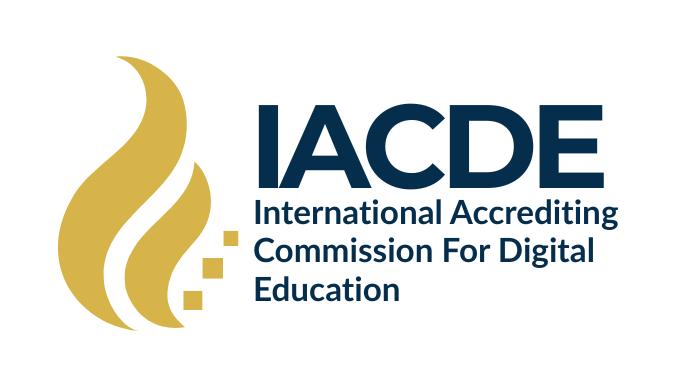Introduction
The global expansion of online and hybrid education has accelerated faster than any other sector of higher learning. Millions of students now study entirely through digital platforms, often crossing borders without ever stepping on a campus. Traditional government-based accreditation systems, however, were built for national, classroom-anchored institutions.
This mismatch has opened space for private and global accrediting bodies to emerge—organizations that are agile, technology-aware, and responsive to innovation. The International Accrediting Commission for Digital Education (IACDE) represents this new generation of quality-assurance institutions.
As Taylor & Francis noted in Quality Assurance in Higher Education (2025), “Emerging forms of delivery and transnational learning require accreditors to develop new models for governance and evaluation.” IACDE answers that call.

1️⃣ The Rise of Private Accreditation
Private accreditors first appeared to fill critical gaps left by national agencies limited to one country or funding system. Today, private frameworks are a strategic necessity in global education.
- Cross-border flexibility: Traditional recognition is restricted by geography. Private accreditors can evaluate institutions serving global learners.
- Digital-readiness: They assess cloud-based LMS systems, AI-driven pedagogy, and e-credentialing.
- Innovation cycles: Private bodies evolve standards faster, publishing annual updates instead of decade-long reviews.
A study in the International Journal of Higher Education Management (2024) found that private accreditors “enable transnational providers to demonstrate quality when operating outside national frameworks.” This is the space where IACDE operates—bridging innovation and assurance for the digital age.
2️⃣ Why the World Needs Independent Accrediting Bodies
Digital education is borderless, yet public accreditation remains territorial. Learners now expect their credentials to hold meaning beyond one nation’s borders. Employers, too, need trusted indicators of quality that transcend local regulations.
Independent accreditors like IACDE provide:
- Benchmarking against international standards such as INQAAHE Guidelines, CHEA IQG, and ISO 21001.
- Recognition for non-traditional providers—faith-based universities, professional academies, and e-learning networks that operate globally.
- Transparency and public accountability through published Policies & Standards and Directory of Recognized Institutions.
- Continuous improvement culture rather than one-time approvals.
These elements create a trust ecosystem that empowers learners, institutions, and partners worldwide.
3️⃣ Common Challenges and Perceptions
Despite their benefits, private accreditors face persistent questions about legitimacy. The key to credibility lies in transparency, governance, and alignment—three pillars central to IACDE’s framework.
▪ Legitimacy
IACDE is a U.S.-registered private body governed by clear incorporation and operational bylaws. Its Authority and Legal Basis page outlines jurisdictional registration and compliance with international QA principles.
▪ Transparency
All documentation—including the Accreditation Handbook, Policies & Procedures Manual, and Fee Schedule—is publicly available. Peer-review outcomes, complaint processes, and appeal mechanisms are published for accountability.
▪ Recognition Misconceptions
While national recognition is one path, international credibility is built through consistency and adherence to global frameworks. Private accreditors demonstrate quality through evidence, peer evaluation, and continuous compliance—not government decree.
4️⃣ Pathways to Global Trust
IACDE’s approach to legitimacy mirrors international benchmarks endorsed by bodies like INQAAHE and CHEA:
| Principle | IACDE Practice |
|---|---|
| Public Accountability | Publication of handbooks, standards, and directory |
| Peer Review Integrity | Multi-national review teams with conflict-of-interest disclosures |
| Continuous Improvement | Annual maintenance and monitoring reports required from members |
| Stakeholder Feedback | Public complaint and appeal policies to ensure fairness |
| International Alignment | Adoption of INQAAHE, CHEA IQG, and ISO 21001 principles in standards |
This alignment demonstrates that private accreditation can uphold—and often exceed—the rigor of public frameworks when properly structured.
5️⃣ How IACDE Implements Best Practice
IACDE was founded on principles of integrity, innovation, and inclusion. Our operational design includes:
- Transparent Governance: Independent oversight ensures no single member can influence outcomes.
- Evidence-Based Review: Institutions undergo self-study, peer evaluation, and continuous monitoring stages.
- Digital-First Standards: Evaluation criteria cover learning management systems, data ethics, and online assessment integrity.
- International Collaboration: IACDE participates in global discussions on digital accreditation innovation.
- Sustainable Fee Structure: A transparent and affordable fee schedule supports rigorous review without burdening emerging institutions (see Accreditation Fee Schedule).
6️⃣ Examples of Impact
Several institutions across Africa and Asia have entered IACDE’s candidate recognition phase, including digital universities and faith-based colleges that previously had no international pathway to accreditation. Through mentorship and peer support, these institutions are now implementing data security policies, faculty training programs, and learner analytics systems aligned with global standards.
Such outcomes illustrate IACDE’s unique role as both an accreditor and a capacity-builder.
7️⃣ The Future of Accreditation and Technology
The next frontier is digital credentialing and AI-based assurance. Blockchain and machine-learning tools can authenticate records instantly, reducing fraud and enhancing trust. IACDE is actively developing guidelines for these technologies, ensuring ethical implementation and data protection.
We also see growing demand for micro-accreditation of short courses, badges, and competency frameworks—an area where traditional models remain silent. IACDE’s flexible structure positions it to recognize innovation without compromising rigor.
8️⃣ Looking Ahead: Redefining Global Trust
Private accreditors are not replacements for public systems—they are partners in progress. By embracing transparency, aligning with international standards, and using technology responsibly, IACDE is proving that quality assurance can be both ethical and adaptive.
Our goal is simple: to build confidence in digital education worldwide. As more institutions seek global recognition, IACDE will continue to mentor, evaluate, and celebrate organizations that advance accessible, faith-aligned, and technologically sound education.
“True quality assurance in the digital age is not about regulation—it’s about responsibility, transparency, and impact.” — Dr. Roxanne Kemp, President, IACDE



Comments are closed